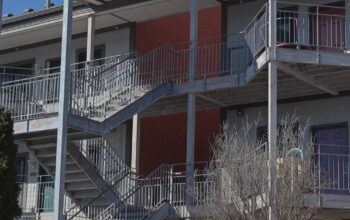When Karyn Riddle logged into Infinite Campus, a database used to track student grades and attendance, she saw a sea of red errors. Missing. Missing. Missing. Missing.
She could tell that her high schooler wasn’t doing his homework.
Almost four years after the Madison Metropolitan School District implemented a new approach to grading, students, parents and teachers are still adjusting. While some acknowledge the benefits of the policy, others worry that it devalues everyday learning and disincentivizes students from completing homework.
A new approach
At the beginning of the 2020 school year, the district made substantial changes to the grading scale used in Madison high schools. Called the Equal Interval Grading Scale, this new system standardized grading, making it impossible for a student to earn less than a 50 percent grade on assignments and emphasized formal assessments.
“Almost two-thirds of our current grading scale is dedicated to describing shades of failure,” the district wrote in a 2020 memo. “In order to correct the traditional grading scale’s disproportionality toward failure, we are going to set a minimum F score of 50 percent to make the gradation of the letter scale more proportionate.”
Ethan Sharp, a math teacher at La Follette High School, has seen the result of this change in his own gradebook.
“If I give them any grade that’s below 50 percent, it’s going to say ‘error,’” Sharp said. “So our gradebooks are geared to where I physically cannot give any kid below 50 percent.”
In alignment with district-wide equity goals, the new grading scale aimed to emphasize a growth mindset and make it easier for students to overcome low grades, according to the district memo.
Noting that teachers in different schools had a variety of gradebook configurations, the district also standardized grading. Summative assessments, such as exams, count for 70 percent of a student’s grade, while formative assessments, including homework, count for 30 percent, according to the memo.
“Formative, it’s not that big of a deal”
Sisters Aviel and Kaiya Mack are students at Madison West High School. Aviel Mack, a junior, plays volleyball and is president of the Black Student Union. Kaiya Mack, a freshman, swims and is settling into high school.
Both report having about two hours of homework most days after school. The assignments fluctuate, and they work to balance their extracurricular commitments with their homework.
“We have familial expectations of greatness and I think that those are just things that we uphold in our household,” Aviel said. “We always try our best on assignments. We try to put our best foot forward when we go to school and we learn new things.”
Aviel and Kaiya get their homework done. However, since the new grading system has reduced the value of formative assignments like homework, they have noticed changes.
“I think that there are times when my classmates and me have talked and were, like, ‘OK, how much of the grade is this worth? Is this a summative assignment or a formative assignment?’” Aviel said. If it's formative, “it's not that big of a deal. But if it's summative, then everyone’s like, ‘OK, let’s get to work.’”
Parents have also noticed their students’ attitudes towards homework have changed as a result of the policy.
As a parent, Karyn Riddle has seen these changes firsthand. Her son, now a college freshman, attended West High School. Because homework made up only a small percentage of his grade, Riddle said he felt the assignments were pointless.
“He would tell me that it doesn’t count, it doesn't matter. Doing any one assignment is not going to affect my grade, so why bother,” Riddle said.
Jennifer Wang, a parent of a senior at West, noticed a similar trend.
“From what I’m observing in my house, homework feels, to my students, a little more optional, like not something that they really have to do,” Wang said.
Teachers say they have seen the effects of this policy. Jessica Hotz, a social studies teacher at East High School, said she was morally opposed to the 70-30 split policy.
“It means that learning every day doesn’t matter; it just matters whether it’s a summative project or a test or something,” Hotz said. “So kids don’t do any of the classwork, even if they're given tons of time to do it in class.”
Hotz also thinks the policy was motivated by a desire to pass more students and keep graduation rates higher.
“I think it’s shortsighted,” Hotz said. “I don’t think it really has the kids’ best interest in mind as much as it does the numbers for the school district.”
“It gives them a chance”
While some parents and teachers have concerns about the grading policy, it is leveling the playing field for some students.
Sharp, the La Follette math teacher, knows that most of his students have responsibilities after school.
“A lot of them work jobs, or they have to take care of younger siblings because whoever's at home with them is working,” Sharp said. “A lot of them just have other commitments outside of school, so they just don't have time in their day to do homework.”
Alicia Grant, the multicultural student services coordinator at West, supports marginalized students, many of whom face barriers outside of the classroom. For them, she says, the homework is too much.
“There’s Wi-Fi issues. There are family issues. There is homelessness. There's so many things that our kids face today,” Grant said. “Slow down and meet the kid’s needs first before you start going into math problems.”
In regard to the 50 percent grading floor, Aviel Mack sees the benefits for students who need extra help.
“I feel like it gives them a chance. I think it's also better to have just 10 percent of a grade to move up versus 60 percent or something like that. It's hard to get back up,” Mack said.
Despite the pros and cons of the grading system, Grant remains hopeful about the future.
“I talk about systematic change all the time and I feel like nobody's listening. But I also know that this is a marathon, not a race,” Grant said. “So I don't think that I will see it in my lifetime, but as long as I keep moving forward and doing baby steps, I think West will be okay.”






